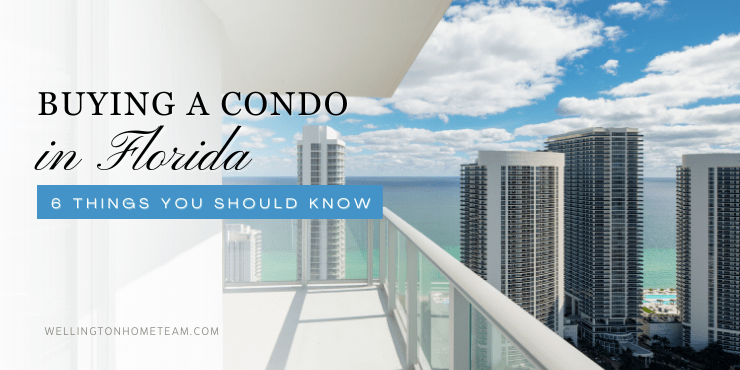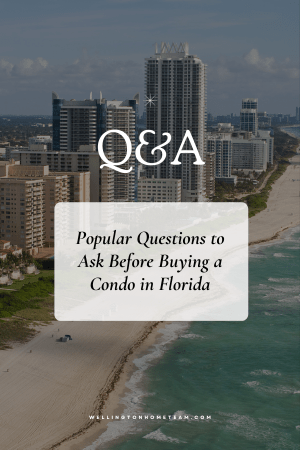Buying A Condo In Florida | 6 Things You Should Know
Buying a condominium (condo) in Florida can be an exciting and rewarding investment. With its warm climate, sandy beaches, and beautiful communities, Florida is a popular destination for both vacationers, snowbirds, and permanent residents. However, purchasing a condo in the Sunshine State comes with its own set of considerations and challenges. In this comprehensive guide, we will explore everything homebuyers should know when buying a condo in Florida.

1. Understanding the Condo Market in Florida
Florida’s condo market has an array of options to choose from, so before starting your condo search it’s important to research each area and identify a specific region that aligns with your preferences and lifestyle
Major cities like Miami, Fort Lauderdale, Orlando, and Tampa have thriving condo markets, each with its own unique appeal. Whether you’re drawn to the relaxed atmosphere of beachfront living or the convenience of urban amenities, researching the different regions and condo buildings is a must.
It’s also important to stay informed about market trends for areas of interest. This includes inventory levels, median prices, and sales activity, by doing so you’ll be able to make an informed decision when you’re ready to buy a Florida condo.
2. Reviewing Condo Docs
When buying a condo in Florida it’s important to understand exactly what you’re buying into. Knowing your rights and responsibilities as a condo owner upfront is crucial, it will help you avoid potential disputes or legal issues down the line. Before buying a condo in Florida you should request and review the following documents:
1. Declaration of Condominium
The declaration of condominium holds significant importance among condo documents as it is the legal instrument that establishes the condominium, which occurs upon its recording in the official records of the county where the condominium is situated.
This document outlines the legal framework for the condo association and defines the rights and responsibilities of unit owners, including the membership and voting rights of unit owners, the sharing of common expenses and surplus, ownership of common elements, maintenance responsibilities of both the association and unit owners, unit identification, use restrictions, procedures for alterations within the condominium, insurance requirements, developer rights during construction and unit sale, and procedures for amending the declaration.
2. Articles of Incorporation
The association’s articles of incorporation cover several key aspects, including the purpose of the articles, the powers bestowed upon the association, the rights of its members, the composition of directors and officers, an indemnification clause for directors and officers, and procedures for amending the articles.
 3. Bylaws
3. Bylaws
The bylaws provide detailed rules and regulations governing the operation of the condo association, including procedures for meetings, elections, and amendments.
4. Rules and Regulations
These documents specify additional rules and restrictions regarding the use of common areas, amenities, and individual units. It will also outline the types of vehicles and pets that are allowed.
5. Association Budget
Review the association’s budget to understand expenses, including maintenance, repairs, and reserves, and ensure they are sustainable and within your budget.
6. Meeting Minutes
Review past meeting minutes to understand any ongoing issues, discussions, or decisions made by the condo association.
7. Financial Statements
Examine a copy of the association’s most recent year-end financial statement. This will help you assess the association’s financial health, including income, expenses, and reserves.
8. Reserve Study
A reserve study assesses the long-term capital needs of the condo association and ensures adequate funds are set aside for future repairs and replacements.
9. Frequently Asked Questions
The Florida Condominium Act underwent amendments in 1992, aimed at enhancing disclosure and consumer protection for potential buyers of condominium units. These amendments mandated both developer-controlled and unit-owner-controlled associations to create a “Frequently Asked Questions and Answers” (often referred to as a “Q&A Sheet”) to aid and safeguard prospective purchasers.
Presently, Section 718.504 of the Florida Condominium Act dictates that the Q&A Sheet must cover various aspects. These include information on unit owners’ voting rights, unit use restrictions such as leasing limitations, details on rent or land use fees for recreational facilities, assessment amounts per unit type, any ongoing court cases with potential liabilities exceeding $100,000, and obligations regarding rent and land use fees for recreational facilities, including mandatory membership and associated fees per unit type.
9. Insurance Policies
Review insurance policies to understand coverage for common areas, individual units, and liability to ensure you have appropriate coverage for your needs.
10. Condo Application
It’s always wise to obtain the condo application before submitting an offer. By doing so you’ll know what is required to apply to the association and the cost associated with the application.
3. Financial Aspects of Condo Ownership
When buying a condo in Florida, it’s important to recognize all of the financial obligations that come with condo ownership. Here are five financial expenses you should take into consideration:
1. Financing Options
If you aren’t paying cash for your Florida condo one of the first steps is exploring your financing options. Conventional loans, FHA loans, and VA loans are the most popular mortgage options available to buyers. However, not all condo communities will qualify for certain loan programs and may have minimum down payment requirements. Financing a condo in Florida involves unique challenges and opportunities. It’s crucial for potential buyers to conduct thorough research, especially when it comes to learning about condo mortgages and the specific options available.
Obtaining a copy of the condo community budget along with its rules/requirements will help your lender determine what loan programs you and the condo qualify for. Once determined your mortgage lender will be able to provide you with your estimated monthly mortgage payment.
2. Down Payment & Closing Costs
Regardless if you are obtaining a mortgage or paying cash you will have to pay closing costs when buying a condo in Florida. Depending on the price point these costs may be minimal, but there will be costs that need to be considered. A Florida title company will be able to help determine these costs.
3. Insurance Requirements
Understanding the insurance requirements for condo ownership is important. Condo owners are typically required to have HO-6 insurance, which covers personal property and liability. Additional coverage for risks such as flood or windstorm damage may be advisable as well.
4. Property Taxes
Property taxes are another financial consideration for condo buyers in Florida. Researching property tax rates in the area where you’re buying is important to understand the ongoing financial obligations associated with condo ownership. Factoring property taxes into your budgeting process ensures you’re financially prepared for the long term.
Palm Beach County Florida property appraisers office has a great online tool to help with this step, you simply enter the property address, click “property tax calculator” and it will provide you with the estimated property taxes for that specific property.
5. COA Dues
Condo Association (COA) dues are a regular expense for condo owners and cover the maintenance and upkeep of common areas and amenities. Knowing the COA dues and any potential increases in the future is important for budgeting purposes.
4. Evaluating Condo Amenities & Facilities
One of the attractions of condo living is the access to amenities and facilities that can enhance your overall quality of life. As you evaluate different condo communities and buildings it’s important to consider the value provided in relation to the condo dues. You’ll also want to take into consideration whether or not you’ll take advantage of the amenities offered.
There is a cost associated with amenities, so the more amenities offered the higher the condo dues may be. If you plan on using the amenities the higher condo fees may be worth every penny. However, if you don’t care what amenities the condo community or building has you’ll want to evaluate the condo dues and if it’s worth the cost.
A lot of condo communities will offer a clubhouse, swimming pool, fitness center, tennis courts, basketball courts, walking trails, and parks. While condo buildings generally offer swimming pools, fitness centers, rooftop decks, recreation areas, spa facilities, business centers, concierge services, pet amenities, and secured parking.
5. Conducting Due Diligence Before Buying
Before making a final decision to buy a condo in Florida, it’s important to do your homework to uncover any possible problems that could impact your investment. It’s important to hire a qualified home inspector to thoroughly examine the condo unit for any issues, code violations, or maintenance needs.
Additionally, take the time to carefully review association documents such as meeting minutes, financial statements, and reserve studies. These documents provide valuable insights into the association’s financial stability and governance. Finally, don’t hesitate to reach out to current residents or neighbors to gather firsthand information about the community, association dynamics, and any concerns or issues they’ve encountered. By conducting thorough due diligence, you’ll be able to make a well-informed decision.
6. Long-Term Planning and Resale Potential
When buying a condo in Florida, it’s crucial to look beyond the immediate excitement and consider long-term implications that may affect your future plans and resale potential. While not everyone plans to sell their newly purchased condo life happens and things change, so it’s equally as important to take into consideration how easy or difficult it will be to sell the condo if the time comes.
You’ll want to prioritize choosing a condo with strong resale value, taking into account factors like location, amenities, and market demand. Additionally, research any planned development or construction projects in the area that could impact property values or quality of life over time. It’s also wise to always have an exit strategy in place for the future, whether it’s due to job relocation, lifestyle changes, or financial considerations.
Popular Questions to Ask When Buying a Condo
Here are some important questions to keep in mind when purchasing a condominium unit from either a developer or a private seller:
 What is the association’s policy regarding pets?
What is the association’s policy regarding pets?- Are there any restrictions on selling or renting units?
- Are the condo dues based on the size of the unit, if so what is the amount?
- What will be your rights regarding ownership and voting within the association?
- What percentage of the common expenses will you be responsible for?
- What limitations are there on the use of common elements and your unit?
- Are there any agreements or contracts associated with the condominium association, and if so, what are their terms?
- What specific maintenance tasks will you need to take care of personally?
- Is the association currently involved in any legal disputes?
- Does the association possess sufficient insurance coverage?
- Has the association set aside funds for future capital expenses and maintenance projects?
- Are there limitations on the number of occupants or guests allowed per unit?
- Is the condominium development finished, or are there plans for additional units?
Many of these questions can be answered by referring to the “condominium documents.” These documents typically encompass the declaration of condominium, articles of incorporation of the association, association bylaws, rules & regulations along with the Frequently Asked Questions and Answers Sheet.
Final Thoughts
Buying a condo in Florida offers a unique opportunity to enjoy the state’s desirable climate, lifestyle, and amenities. However, prospective homebuyers need to approach the process with careful consideration and due diligence. It’s important to educate yourself and make an informed decision before purchasing a condo in the Sunshine State.
Please consider spreading the word and sharing; Buying A Condo In Florida | 6 Things You Should Know
Thinking about buying a condo in Florida? If so here are six things you should consider and know about before making a purchase. #condobuying #floridacondoAbout the Author
Top Wellington Realtor, Michelle Gibson, wrote: “Buying A Condo In Florida | 6 Things You Should Know”
Michelle has been specializing in residential real estate since 2001 throughout Wellington Florida and the surrounding area. Whether you’re looking to buy, sell or rent she will guide you through the entire real estate transaction. If you’re ready to put Michelle’s knowledge and expertise to work for you call or e-mail her today.
Areas of service include Wellington, Lake Worth, Royal Palm Beach, Boynton Beach, West Palm Beach, Loxahatchee, Greenacres, and more.

 Michelle Gibson of the Hansen Real Estate Group Inc is a full-time REALTOR who has been specializing in Wellington, Florida real estate since 2001. This veteran of the real estate industry has expertise in technology, marketing, and social media.
Michelle Gibson of the Hansen Real Estate Group Inc is a full-time REALTOR who has been specializing in Wellington, Florida real estate since 2001. This veteran of the real estate industry has expertise in technology, marketing, and social media.